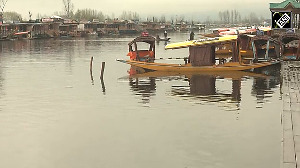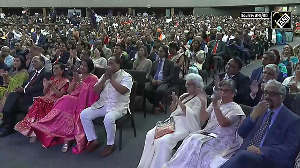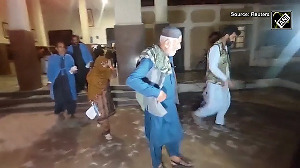On May 22, one of the hardest fought battles in Karnataka will come to an end. Although both the Congress and the Bharatiya Janata Party claim that they will romp home with a majority, exit polls and poll pundits maintain that like 2004, this time too Karnataka will have to deal with a hung verdict, which means it is back to the same old coalition drama.
More: Battleground Karnataka
The BJP camp is hopeful of 130 seats, while the Congress claims that it would win anything between 140 and 150 seats. The JD-S, which is one among the three major parties in Karnataka, maintains that it would still play kingmaker as both its rivals will fall short of the required numbers in the 224-member Karnataka legislative assembly.
Dr K S Shetty, political analyst from Mangalore, says that without a doubt it would be a hung verdict this time too.
According to him, the BJP will wind up with 76 seats, the Congress, 70 and the JD(S) 72.
H N Nagaraj from Bangalore, who has been studying the developments carefully, thinks otherwise. While he too agrees that there would be a hung verdict, he feels that the BJP will emerge as the single largest party with 100 seats.
According to him, the Congress would get 95 seats and the JD-S 22.
Pramila Nesargi, former BJP legislator from Bangalore, is of the view that her party will win anything between 130 and 135 seats. She says that the party had bounced back into the game in the second phase and in the third phase the large Lingayat population will help the BJP sail through with a comfortable majority.
She feels that the Congress will win anything between 50 and 55 seats while the JD-S may get 20 to 25 seats.
"Prior to the election, I had not expected the JD-S to win those many seats, but in the two phases of polling it has become clear that the JD-S has made gains in Congress strongholds and hence they may turn the tables in at least 25 constituencies," says Nesargi.
Dr Shetty says the BJP may have had the edge prior to the commencement of the election process. The undercurrent, which was there in October 2007, is missing now. The sympathy for the party has gone.
On the other hand, rural Karnataka will work wonders for the JD-S, who have not forgotten the rural stay programmes by Kumaraswamy. For the JD-S this time, it is Kumaraswamy, who will fetch 60 per cent of the party's share of the votes, he adds.
This brings us to the subject of a secret pact, which none of the netas are willing to confirm. Be it, Mallikarjuna Kharge, N Dharam Singh or B S Yeddyurappa, they all are of the view that they will form the government on their own.
Poll pundits and sources in both the Congress and the JD-S say that on May 25 evening once the counting is over, the JD-S will extend support to the Congress.
A senior leader in the Congress told rediff.com that the two parties have a secret pact to form the government in order to keep the BJP away. Prior to the elections, the JD-S had agreed that the Congress would have its chief minister while the JD-S would occupy the deputy chief minister's chair.
However, the equation could change depending on the number of the seats the JD-S manages to get in the final tally.
Nagaraj feels that the JD-S has to enter into a coalition and needs to stay in power. They have entered into this election on the back foot, especially after the coalition drama and power is the only thing that can save their party.
In case the JD-S decides to stay out of power, the party could lose heavily in the next elections too.
BJP leaders, who are confident of a landslide victory, however, add that they have not entered into a secret pact with any party. Senior BJP leader L K Advani publicly said that his party has decided to sit in opposition if they fall short of the required numbers -- a statement that had irked several Karnataka BJP leaders, who have been talking in terms of a sweep.
Political experts feel that the most likely coalition to be formed in Karnataka is between the Congress and the JD-S. The ideologies are same (as of now) and the JD(S) would not want to associate itself with the BJP especially after the drama that ensued between the two parties which finally forced the entire state to go for a premature election.
A report by the Intelligence Bureau, which was prepared immediately after the fall of the JD-S-BJP coalition, stated that Gowda had left for New Delhi the very same day to meet Congress leaders and had struck a deal on a coalition government in the event of elections.






 © 2025
© 2025